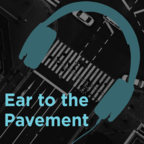
Ear to the Pavement
Summary: Ear to the Pavement is a podcast about radical urban social movements. We feature interviews with people who are thinking, writing, working, and organizing on the front lines of transformative urban planning and policy.
- Visit Website
- RSS
- Artist: Allison Lirish Dean
- Copyright: ℗ & © 2016-2022 Allison Lirish Dean
Podcasts:
The billions in tax breaks Amazon is slated to receive for its new headquarters in New York and Virginia has been big news lately, but for tax policy watchdog and Good Jobs First founder Greg LeRoy, Amazon's HQ2 is just the latest chapter in the company's long history of gaming the U.S. tax system. In this episode of Ear to the Pavement, we dive into the myriad ways Amazon has been dodging taxes from day one, the consequences for local economies and the public services we rely on, and what we can do to rein in the tax-break-industrial-complex that funnels taxpayer dollars to wealthy corporations that don't need it.
Social justice non-profit PolicyLink has documented how a focus on racial equity has led to more business success for companies like PayPal, Prudential, and Gap, and they're using these examples to convince more corporations to embrace racial equity. But where does this approach to racial justice come from, and how far can it take us? In this episode, PolicyLink Founder and CEO Angela Glover Blackwell and author and labor activist Bill Fletcher, Jr. unpack the argument that racial equity gives companies a competitive advantage, and what it means for our politics.
Of all of the things there are to worry about in the Trump era, climate change is at the top of the list. But the failure to act effectively on climate long predates Trump. Anne Peterman, executive director of Global Justice Ecology Project, argues that by promoting market-based solutions such as carbon trading, a series of American presidential administrations have not only failed to address climate change, but have also helped enrich corporations at the expense of poor and indigenous communities worldwide. What we really need in order to solve the climate crisis is a collective effort to transform society. But how might this happen, and what would a truly sustainable world look like?
In too much American political discourse, economic issues and identity issues are treated separately, even though they're deeply connected. This has been divisive and disastrous for the Left. But what does a politics that truly integrates race and class look like? The League of Black Revolutionary Workers has an answer. Formed in 1969 and lasting only a few years, the League was one of the most politically sophisticated movements in American history. Dan Georgakas, author of Detroit, I Do Mind Dying, explains what we can learn from them today.
In Episode Five of Ear to the Pavement, housing organizer Rob Robinson recounts his journey from homelessness to the housing movement, and explains how Take Back the Land, an organization he co-founded, used radical organizing to successfully fight the corporate forces that helped create the foreclosure crisis. Robinson is currently a volunteer organizer with the National Economic and Social Rights Initiative (NESRI), and is connected to housing and land movements in Europe, South Africa, and Brazil.
Since Trump was elected, leftist independent media outlets have been on the rise. Current Affairs Magazine is at the forefront of this movement. In this episode, Current Affairs founder and editor, Nathan J. Robinson, talks about the experiences that led him to start his own media organization, the importance for the Left of getting out of the elite media bubble and reaching a broad audience, and the crucial ingredients for building an effective progressive media.
In Episode Four of Ear to the Pavement, documentary filmmaker and teacher Louis Massiah talks about the importance of using media to focus attention on the concerns and experiences of ordinary people. One of the country's most important and celebrated pioneers in the field of community media, Massiah is Founder and Executive Director of the Scribe Video Center in Philadelphia, a media arts center which has been around since 1982. The center's mission is to help communities in the Philadelphia area learn to make media both as a means of artistic expression, and as a tool for progressive social activism.
As more and more people are displaced by gentrification, war, deportation, economic instability, and other forces, the concept of "Root Shock" is as relevant as ever. In Episode Three of Ear to the Pavement, psychiatrist, author, and scholar Mindy Thompson Fullilove revisits her classic book Root Shock: How Tearing Up City Neighborhoods Hurts America and What We Can Do About It. Well before it was an accepted idea, Fullilove documented how people's ability - or lack thereof - to put down roots and shape their communities influences not only individual mental health, but society as a whole.
In Episode Two of Ear to the Pavement, we present an extended interview with planning scholar, author, and activist Tom Angotti about his personal reaction to the rise of Donald Trump, how we got here, his biggest concerns, and how progressives might respond. This interview delves further into themes Tom covered in his November piece in Progressive City, Trump: What Can Progressive Planners Do?
In Episode One of Ear to the Pavement, Allison Lirish Dean speaks with New York City-based journalist and author Neil DeMause about gentrification and development in Brooklyn, and his new book, The Brooklyn Wars: The Stories Behind the Making of New York's Most Celebrated Borough